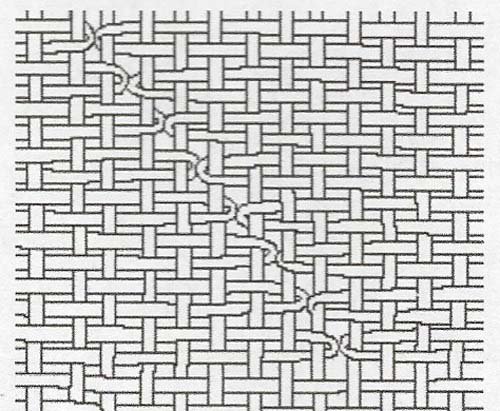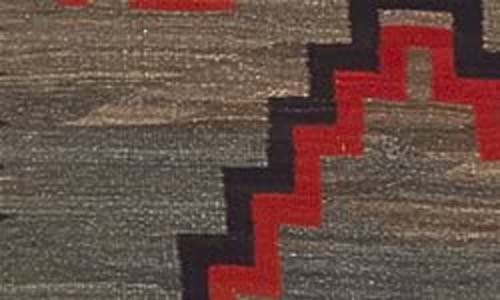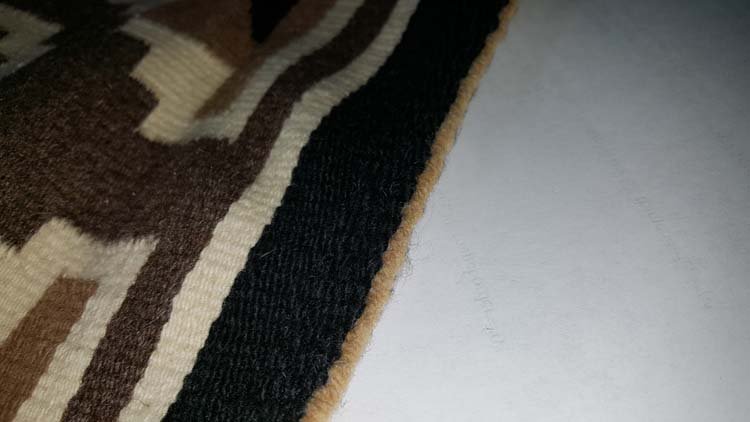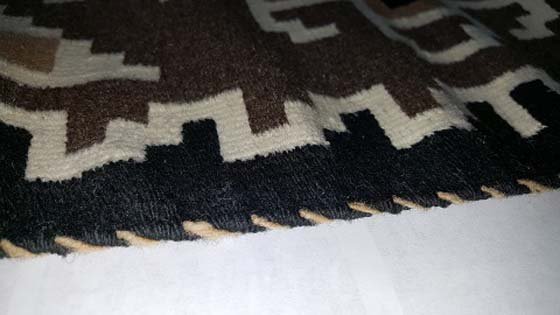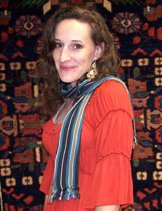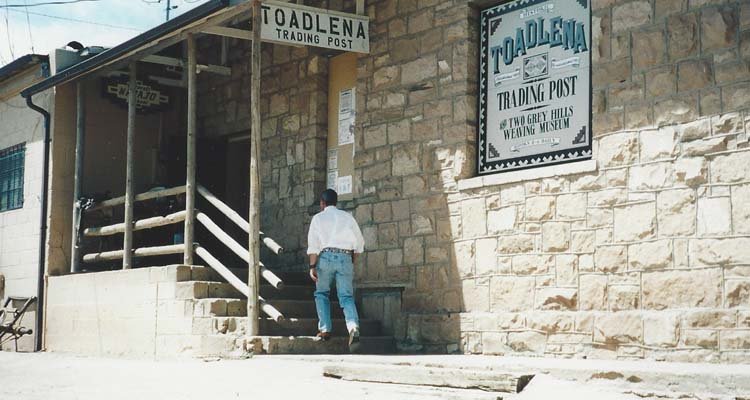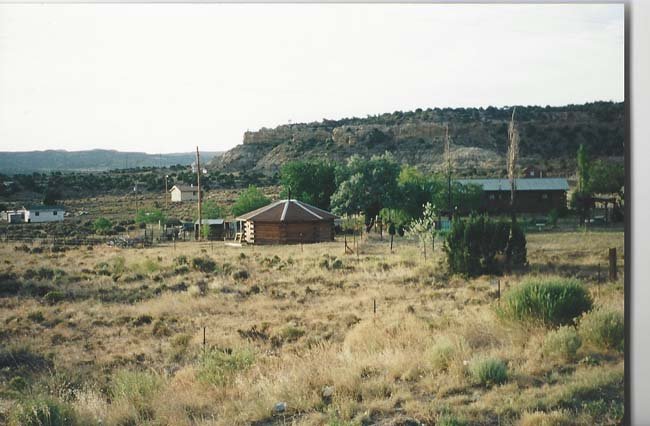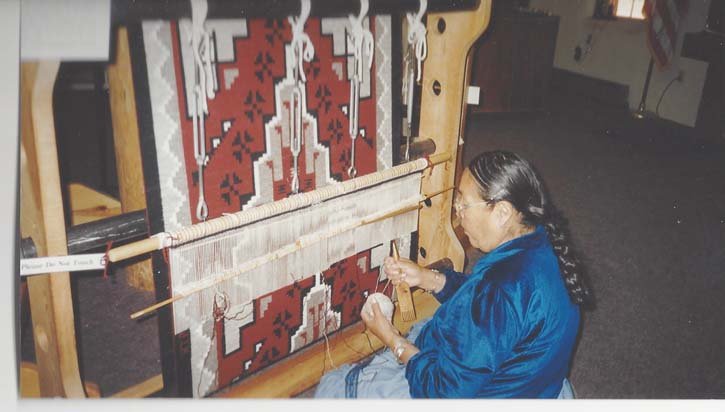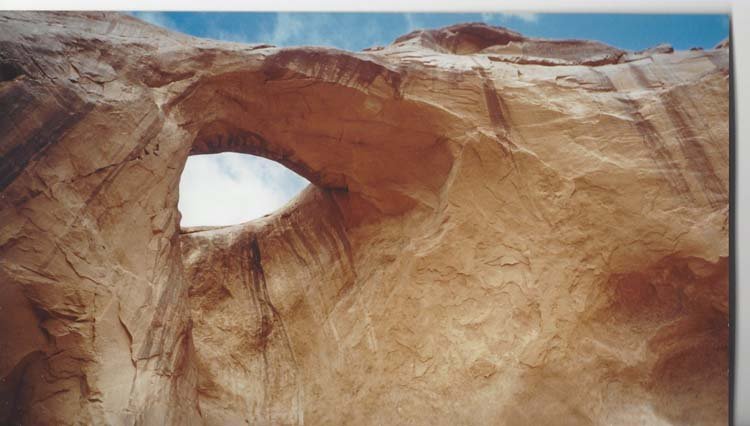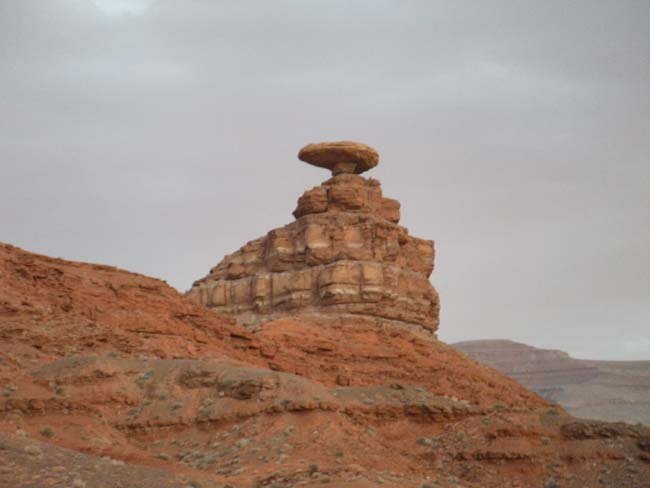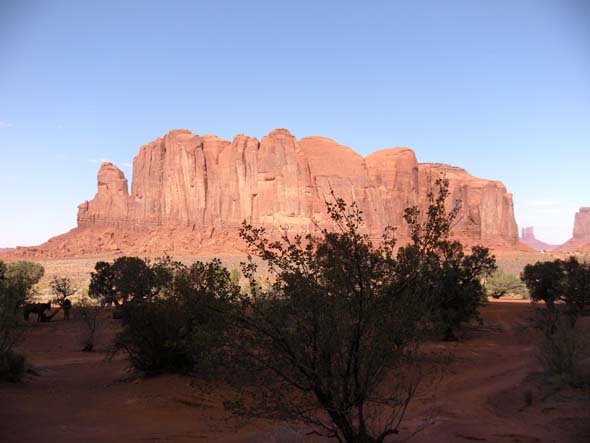AUTHENTIC NAVAJO RUG?
Is a rug an authentic Navajo rug? How to tell? An authentic Navajo rug is an individual piece of art. To own one is very special. But, buyer beware, copies of Navajo rugs abound!
Fortunately, there are several ways a savvy buyer can inspect a rug and with a good eye and patience be reasonably sure (or unsure) a handmade rug is really an authentic Navajo rug.
Please keep in mind, as with any hand-woven rug look for quality craftsmanship, though no rug should or would be 100% perfect (unless it is machine-made).
FIRST...A FEW DEFINITIONS
WARP
Warp cords are the vertical cords which serve as the foundation of the rug and go from top to bottom. The preferred composition of the warp yarn is wool. Cotton warp cords would not be strong enough for the item to be used as a floor covering.
WEFT
Weft threads are the horizontal threads that cover the warp threads, or the yarn that is woven over and under the warp and goes from side to side. These will likely be wool.
LAZY LINES
This is not a fair description, but a 'lazy' line occurs when a weaver is weaving a wide fabric and does not want to reach from one side to the other with each weft. It is a subtle diagonal break in the weave to allow the weaver to work on one section and then move over to the next. Not every Navajo weaving contains lazy lines.
SPIRIT LINES
When the Navajo weaver works on a rug, she puts her soul, her energy, her spirit into it. Sometimes you will find a small thin line which extends from the center across the border to the outside edge. Sometimes it is a line placed near a corner and made of the same color as the background of the field.
When the weaving is completed, the belief is the energy and spirit woven into the rug must be released so the weaver will have the energy and spirit to continue weaving other rugs.
GENERAL GUIDELINES FOR
HOW TO TELL IF A RUG IS AN
AUTHENTIC NAVAJO RUG
LOOK
- Look carefully at the entire rug and check the overall design.
- There should be no wrinkles.
- The horizontal and vertical lines should be straight and uniform in width.
- The ends should be the same width.
- The tightness of the weave should be uniform throughout the rug.
- The colors should harmonize.
- The reds should be deep.
- Grey and brown hues in Navajo rugs are often 'streaky'. This is caused by slight variations in the wool color of the sheep. Rugs that are copies usually use commercial dyes which will look more uniform in color. The greys in the Mexican 'knock-offs' will be solid.
FEEL
- Feel the rug.
- It should be smooth with no areas that are thicker or thinner.
FRINGE?
The rug should not have a fringe on either end. *
WHY?
Navajos are the only weavers who
use what is known as a continuous warp. Using an upright loom, the weaver
starts the warp (the cord that runs up and down) at one corner, goes up to the
top of the loom, turns around and goes back down and this is repeated over and
over. Thus, the actual length of the rug is determined before the rug is woven and
the design of the rug must end when the length of the rug has been reached. The
ends are not cut off but sewn with a needle. Weaving in this way is very time consuming.
Weavers producing rugs made to look like Navajo rugs but not woven the traditional Navajo way will have fringes. Their rugs will be cut from the looms and the fringed ends will need to be brought back down into the weaving in order to make it look more ‘Navajo-like.’ This causes ridges in the ends of the rugs from doubled up warps.
Therefore, one foolproof way to determine a fake Navajo rug is by examining the ends to see if the warps were tucked back in or if they are truly continuous. If they are tucked in, then every other warp area will have two threads.
*There are 2 exceptions to the ‘no fringe’ rugs. These are Navajo rugs known as Germantown rugs, which may have had a fringe added on after they were woven, and the popular souvenir Gallup throws that are not woven in the traditional way.
TWISTED SIDE SELVAGE CORD?
Navajo rugs will often have a twisted side selvage cord. This helps the weaver to keep a straight edge. Not having these cords does not necessarily mean the rug you are looking at is not a Navajo rug.
WOOL WARP CORDS?
Separate the yarns to expose the warp cords at both ends. In Navajo rugs, they will usually be wool and will be thick in texture and the fibers can be seen sticking out from the threads. (Gallup throws are woven with a cotton warp, rather than wool.)
WIDE END BORDERS AND ADDED ON END CORDS?
Mexican rugs, particularly those made by the Zapotecs, are the most common counterfeit Navajo rugs. If there are wide end borders and end cords that are added after the rug is woven, the rug is unlikely to be an authentic Navajo rug.
WARP BUNDLES ON THE EDGE OF EACH SIDE?
Check the edge of each side. If you find a bundle of warps, then it may not be an authentic Navajo rug.
If a rug has these bundles, check to see how many warp threads make up that bundle. If it is an authentic Navajo rug there would only be two or three warp threads that would make up that bundle and there would be only a single warp thread next to that bundle.
General Care of Navajo Rugs Between Cleanings
In between professional cleanings, regular normal vacuuming is usually all that is needed. After each vacuuming, reversing the rug or turning it would be helpful to ensure it wears uniformly on both the sides and the ends.
Every area rug, Navajo or not, should be
placed on a proper rug pad to keep it from slipping and to protect its
dimensional stability.
If your Navajo rug is hung on a wall, be sure to inspect both sides regularly for the possibility of moth infestation. Rugs that are walked on regularly and turned are much less likely to attract moths.
Dyes may run if the Navajo rug gets wet so blot up any liquid as soon as possible. Please call or text ABC to service your rug should it come into contact with urine or any other liquid. Always blot. Do not rub.
NEED HELP?
ABC is here to help if you have any questions about Navajo rugs. Just call or text our office at 607-272-1566 and one of our staff will be happy to speak with you and answer your questions.
We specialize in the cleaning and repair of Navajo and other specialty rugs.
"The Cleanest Clean You've Ever Seen."
by
ABC Oriental Rug & Carpet Cleaning Co.
130 Cecil Malone Drive Ithaca, NY 14850
607-272-1566
